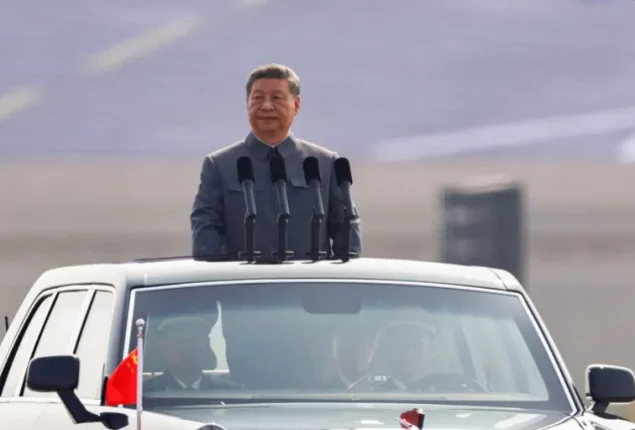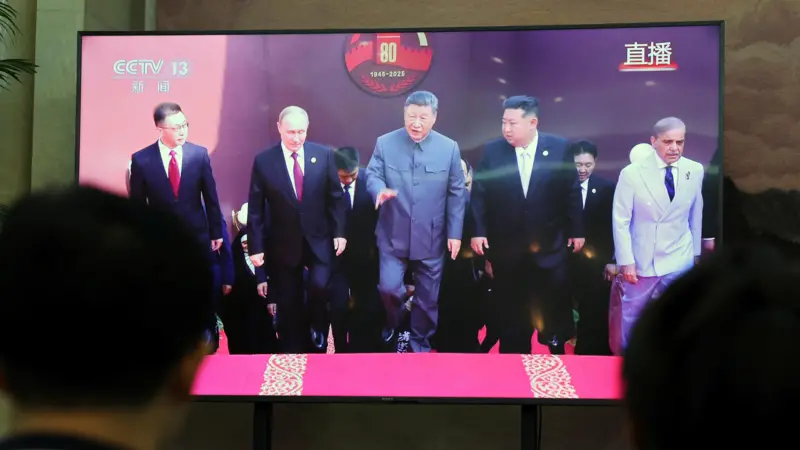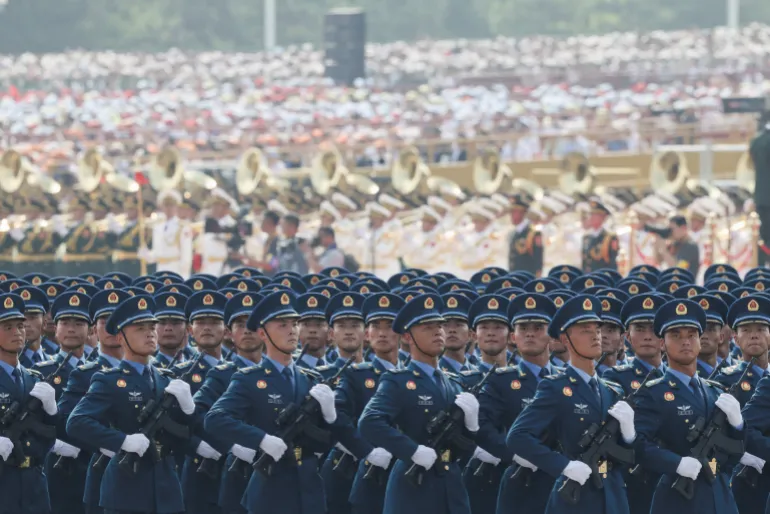
Chinese President Xi Jinping stands in a car to review the troops during a military parade to mark the 80th anniversary of the end of World War II, in Beijing, China, on September 3, 2025
Beijing: Chinese President Xi Jinping oversaw the largest military parade in the nation’s history on Wednesday.
The event drew international attention not only for its scale, but for the high-profile attendance of Russian President Vladimir Putin and North Korean leader Kim Jong Un — two of the world’s most diplomatically isolated figures.
Adding to the geopolitical significance of the occasion, Pakistan’s Prime Minister Shehbaz Sharif was also in attendance, underscoring a deepening network of strategic partnerships in the region.

Prime Minister Shehbaz Sharif also attended the event.
The parade, held in Tiananmen Square to commemorate the 80th anniversary of Japan’s defeat in World War II, was thick with symbolism, propaganda, and strategic messaging. With over 50,000 spectators, thousands of troops, and state-of-the-art military hardware on display, the event was a powerful reminder of China’s growing geopolitical confidence.
“Today, mankind is faced with the choice of peace or war, dialogue or confrontation, win-win or zero-sum,” Xi declared in his keynote address, positioning China as a force for global stability while sending an unmistakable warning to adversaries. “The Chinese people firmly stand on the right side of history.”
Putin, Kim, and the “Axis of Autocracy”
Western leaders largely snubbed the event, but Putin and Kim — pariahs due to the Ukraine war and North Korea’s nuclear ambitions — were the guests of honour. The trio were frequently seen in conversation, projecting a unified front amid rising tensions with the West. Kim’s presence marked the first time a North Korean leader has attended a Chinese military parade in over six decades.
Seated between Putin and Kim, Xi smiled and spoke with both throughout the 70-minute spectacle, which included missile systems, drones, tanks, fighter jets, and helicopters flying in formation above. The event culminated in the release of 80,000 white doves and vibrant balloons, symbolizing peace, even as the display underscored China’s combat readiness.
Kim Jong Un was accompanied on his trip by daughter Ju Ae, believed to be his potential successor, though she did not appear at the main parade.
Global Reactions and Strategic Implications:
In the U.S President Donald Trump took to Truth Social, sarcastically sending his “warmest regards” to Xi, Putin, and Kim “as you conspire against the United States of America,” while playing down the parade’s strategic implications.
Japan declined to comment directly, though officials reiterated Tokyo’s commitment to building constructive ties with Beijing.
Meanwhile, Pakistani President Asif Ali Zardari extended congratulations to China, highlighting the “monumental sacrifices” of the Chinese people and reaffirming the strength of the China-Pakistan relationship.
Analysts suggest the event could signal a deeper alignment between Beijing, Moscow, and Pyongyang. The parade followed June’s defense pact between Russia and North Korea and speculation of a similar Beijing-Pyongyang agreement, developments that could reshape Asia-Pacific military dynamics.
“Xi feels confident that the table has turned. It’s China that is back in the driver’s seat now,” said Wen-Ti Sung, a fellow at the Atlantic Council. He noted that Western unpredictability, particularly under Trump’s leadership, has been more destabilizing than China’s assertiveness.
Military Modernization and Internal Tensions:

Members of the Chinese People’s Liberation Army (PLA) Air Force march during a military parade to mark the 80th anniversary of the end of World War II, in Beijing, China, on September 3, 2025
The parade also served to highlight China’s rapid military modernization — and distract from domestic turbulence. In the past two years, numerous top PLA generals have been purged in a sweeping anti-corruption campaign, casting a shadow over Xi’s control of the military.
“The parade allows Xi to focus the world’s attention on its impressive strides in modernizing its military hardware, while overshadowing the stubborn challenges afflicting the PLA,” said Jon Czin of the Brookings Institution.
From Beijing’s closed roads to midnight rehearsals and nationwide party mobilization, the Chinese government orchestrated every detail of the parade to reinforce national unity and demonstrate internal strength.
Civil servants across the country were required to watch the broadcast and write reflections, highlighting the event’s role as both a global statement and a domestic loyalty test.
Toward a New Global Order?
Xi used the occasion to reinforce his vision of a new multipolar world, free from “hegemonism and power politics” — a thinly veiled critique of U.S. dominance. He cast World War II as a turning point in China’s rise, framing the nation’s “great rejuvenation” as historically inevitable and “unstoppable.”
For now, the parade may be over, but the geopolitical messages continue to echo — from Tiananmen Square to Washington, Moscow, and beyond.
Read More News On
Catch all the International News, Trending News, Breaking News Event and Latest News Updates on The BOL News
Download The BOL News App to get the Daily News Update & Follow us on Google News.




